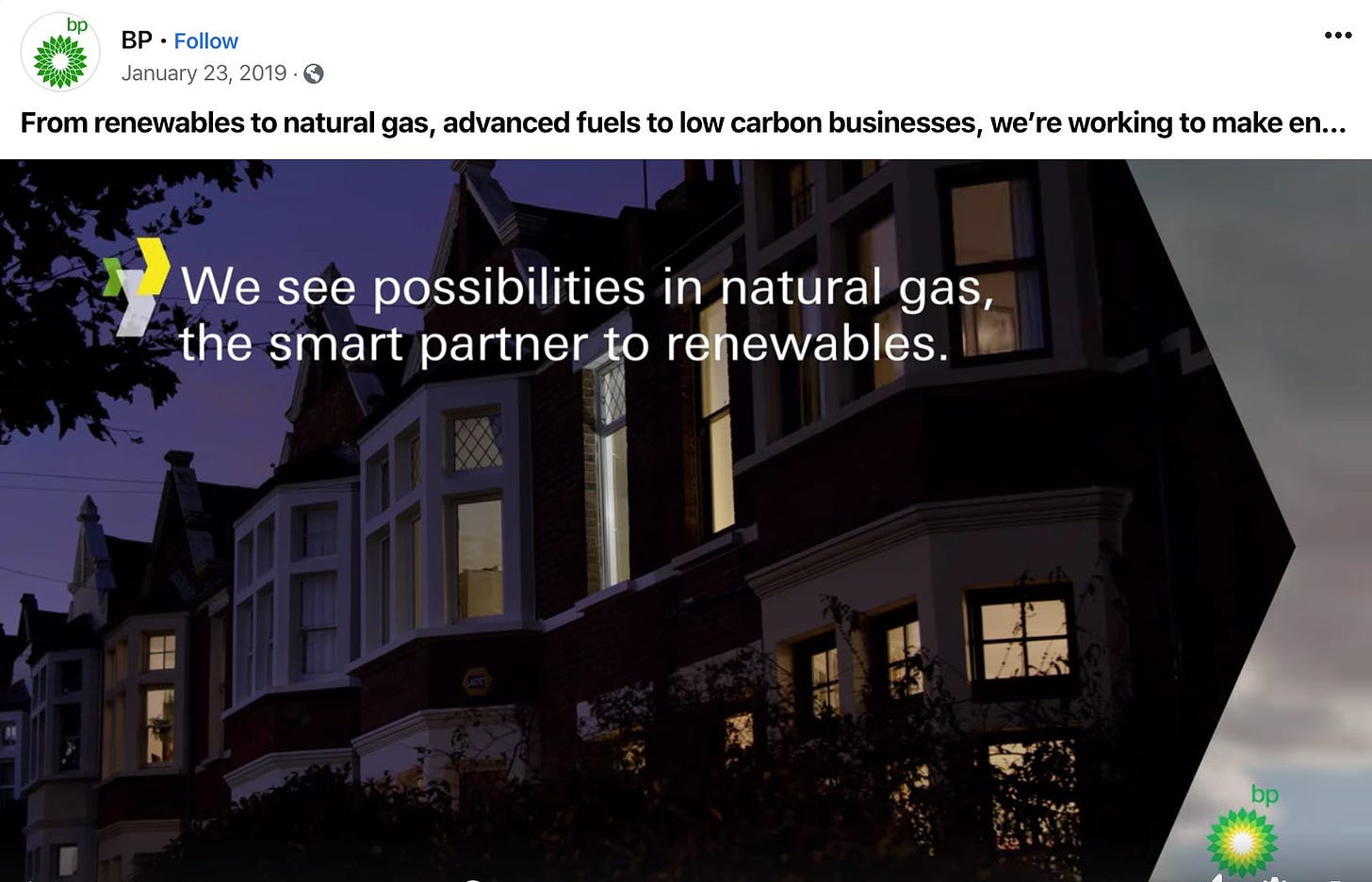“The Daily” runs a greenwashing BP ad
The Daily promised to end fossil fuel sponsorships in 2021. BP promised to stop “corporate reputation advertising” in 2020.
In 2021, in response to growing concerns about the fossil fuel industry’s role in climate delay, The New York Times pledged to ban oil and gas companies from sponsoring “its climate newsletter, its climate summit or its podcast ‘The Daily.’”
But it appears there are limits to that pledge. Because last week, The Daily aired an ad from BP touting the petroleum giant’s climate credentials.
Here’s what some of The Daily’s millions of listeners heard at the beginning of Wednesday’s episode:
BP added more than $70 billion to the US economy last year by making investments from coast to coast. Investments like acquiring America's largest biogas producer, Archaea Energy, and producing natural gas with fewer emissions in the Permian Basin.
It's ‘and,’ not ‘or’. See what doing both means for energy nationwide at bp.com/investinginAmerica.
That website leads to a page that touts BP’s green efforts in the U.S. “We are relentlessly working to reduce emissions, improve products and create new low-carbon businesses,” it says.
“It's a pretty clear cut case of misleading advertising … It does sort of boggle my mind how The New York Times could allow that.”
“It's a pretty clear cut case of misleading advertising,” said Robert Brulle, a professor at Brown University who studies the fossil fuel industry’s influence on the media and government. “They're trying to create this veneer of being part of the solution [to climate change], not part of the problem.”
A close look at BP’s operations show its emissions reductions are minimal relative to its entire operation. The oil giant is electrifying its diesel generators and compressors in the Permian Basin, limiting its gas flaring, and installing methane monitors so it can catch leaks from its own gas pipelines. Meanwhile, BP says it will double its production of oil by 2030 and expand its liquefied natural gas production to 30 million tons per year.
“All they're doing is reducing the leaks from their production process to bring us more fossil fuels,” said Brulle, who published a paper in the journal Climatic Change in 2020 about how fossil fuel companies try to influence public perception through well-respected media outlets.
“It does sort of boggle my mind how The New York Times could allow that,” he added.
New York Times spokesperson Elizabeth MacAulay Young told HEATED that “We do not allow oil and gas companies to sponsor The Daily wholesale.” Young did not answer our questions about the difference between fossil fuel ads and fossil fuel sponsorship.
The Times also did not respond to questions about how the ad passed its advertising guidelines, which prohibit advertising that is “intentionally misleading, deceptive, or contains false information.” But in a statement in 2021, The Times revealed the reason it continues to run fossil fuel ads: “Advertising helps support our newsroom, which covers the issue and impacts of climate change more than any other in the U.S.”
Brulle said that doesn’t surprise him, given that oil and gas companies have been using The New York Times to boost their social license to operate since at least the 1940s.
“The New York Times is trying to skate a fine line,” he said. “They want to continue to reap the benefits of fossil fuels company sponsorship, but not violate their policy of allowing intentionally misleading advertising.”
Greenwashing experts told HEATED that BP’s ad uses a common fossil fuel misinformation technique called paltering. Paltering is when companies tell a selective truth in order to mislead people into believing a lie.
For example, BP's ad said it produced fewer emissions in one oil field, without specifying the type of emissions or what the measurement was in relation to. This selective truth obscures the whole truth—that BP made $13.8 billion last year, the vast majority of which came from oil and gas.
BP is well-known for its use of slick phrasing to mislead the public about climate change. In 2004, BP invented the term “carbon footprint” to put the onus of climate change on the individual, and away from the industry. “This is one of the most successful, deceptive PR campaigns maybe ever,” Benjamin Franta, a senior research fellow at the University of Oxford, told Mashable when they broke the story.
But The New York Times should know better than to fall for BP’s deceptive marketing, because it has reported extensively on corporate greenwashing. A 2022 article titled “How greenwashing fools us” explained, “Greenwashing is everywhere. And, according to a recent study by a global consulting firm, it’s also very effective. Worst of all, it works especially well on those who say they are concerned about the environment.”
The Daily, which has yet to tackle greenwashing in its 2,000 episodes, did not respond to our questions. But the fact that The Daily banned fossil fuel sponsorships in the first place is an acknowledgement that higher-ups are concerned.
“Of course they understand what's going on,” Brulle said. “And they're hoping that they won't get called out.”
BP’s broken promise to stop “corporate reputation advertising”
Another reason BP’s greenwashing ad in The Daily is notable: It means the oil company has broken one of its major climate promises.
In February 2020, HEATED broke the news that BP pledged to stop "corporate reputation advertising" as part of the oil company’s much-publicized promise to reach net zero emissions by 2050.
At the time, a BP spokesperson told HEATED that the company’s goals “include stopping corporate reputation advertising, like the Possibilities Everywhere campaign, and re-directing the money to promote net zero policies, ideas, actions, collaborations and our own net zero ambition.”
But eight months after HEATED’s story, BP issued a statement saying it would continue to run advertisements about climate change–just not ones that try to boost its own reputation. It read:
“When [BP CEO] Bernard Looney announced our net zero ambition in February, one of the aims was to stop investing in corporate reputation advertising. And that’s what we did. …
But Bernard didn’t say we would stop all advertising. In fact, to help the world reach net zero we said we would actively advocate for progressive climate policies, including through advertising.
In other words, BP claims its climate-related advertisements today are solely “promoting progressive climate policies,” not BP’s own green reputation.
But that’s not what greenwashing experts say about BP’s ad in The Daily.
“They're trying to create the impression that they're reducing emissions,” said Brulle.
BP did not respond to HEATED’s questions about whether the ad violates the company’s corporate advertising pledge. Instead, BP spokesperson Paul Takahashi repeated the claims from the ad. “The Permian Basin is a key part of bp’s strategy to produce natural gas with fewer emissions,” Takahashi wrote in an email. He added that the company’s strategy includes electrification and reducing methane leaks—not cutting back oil and gas production.
BP’s long history of climate misinformation
BP’s 2020 promise to stop running greenwashing climate ads did not come solely from the goodness of its corporate heart. It came after a legal challenge that alleged the oil giant’s climate ads were misleading.
In 2019, U.K.-based legal non-profit ClientEarth launched a complaint against BP over its global “Possibilities Everywhere” ad campaign, which touted the oil giant’s commitment to a “low carbon” future. The complaint alleged these advertisements were fundamentally misleading, and had thus “breached international guidelines governing corporate conduct,” the Guardian reported.
BP has also faced legal challenges over its greenwashing advertising from the State of New York, which sued the oil company in 2021 for “allegedly ‘greenwashing’ their practices to make them seem more eco-friendly than they are,” CNN reported.
And in 2022, peer-reviewed research found that BP’s climate advertising likely did amount to greenwashing, as there was “ no evidence that [BP was] investing in clean energy at a scale that would allow them to shift away from fossil fuels,” NPR reported.
Still, it’s clear that BP still believes the benefits of greenwashing in outlets like The Daily outweigh the threat of legal liability for misleading consumers.
That’s because the kind of people who can directly influence BP’s future—policymakers, shareholders, journalists, and academics—listen to The New York Times.
“Basically what they're trying to do is influence elite opinion,” said Brulle. “That's what drives their cultural legitimacy and their perception by the government.”
More experts react to BP’s ad:
“Now, did BP's acquisition of [Archaea] do anything to lower emissions? Probably not much. Sure, maybe they can leverage their vast size to increase the amount of landfill gas produced by Archaea, but my hunch is that it is mainly a way to make BP look better.”—Thomas Lyon, sustainability professor at the University of Michigan
“The reality is that natural gas is a fossil fuel and burning it produces carbon pollution. Moreover, the process of natural gas recovery leaks substantial methane—also a greenhouse gas—into the atmosphere, causing further warming. Investment in natural gas is displacing investment in true clean energy sources that don’t contribute to climate damage.”—Michael Mann, climatologist and geophysicist at the University of Pennsylvania
“The damage done by climate change, measured now in dozens of billions of dollars from extreme weather disasters every year, far outweighs any nominal supposed economic benefits from fossil fuels.”—Michael Mann
“From the International Gas Union's strategy documents, we know the gas industry considers climate change a ‘potentially existential’ threat to the business of the fossil gas value chain—those are its own words—and so it has devised strategies to ‘defend and enhance’ the role of gas.”—Faye Holder, program manager and misinformation expert at InfluenceMap
Catch of the day: We’re delighted to share one of our favorite bejeweled birds this week—an Allen’s hummingbird named Milo. This little guy visits readers Kirsten and Danté every day, where he hangs out on a swing they installed just for him.
Want to see your furry (or non-furry!) friend in HEATED? It might take a little while, but we WILL get to yours eventually! Just send a picture and some words to catchoftheday@heated.world.







I always admire how you go about reporting a story, all the angles you dig into in order to triangulate aspects of the truth. I will never tire of the phrase “XX didn’t respond to our questions for this story,” which in this case turns BP’s snub around on them. As a pretty regular listener of NYT Daily, I missed that BP ad. Short of emailing my disgust, what else can I do? Thanks for covering such important stories. Happy to support with my paid subscription.
How do we fight against a quarter billion dollars in profit every week? In a culture that clearly glorifies money over every other facet of human existence, how do we resist this sort of financial muscle?
Advertising works - which is why BP spends so much on it, and why every politician out there is sending emails 5 times a day telling us if we don't send them money the world will collapse around us. Where does that money go? Political ads that no one can stand, of course.
And yet we continue to send money to politicians, and we continue to patronize companies that actively deceive us, and destroy our environment.